Unit 3 Coulod you please clean your room?(Section A 3a-4c)课件
文档属性
| 名称 | Unit 3 Coulod you please clean your room?(Section A 3a-4c)课件 | 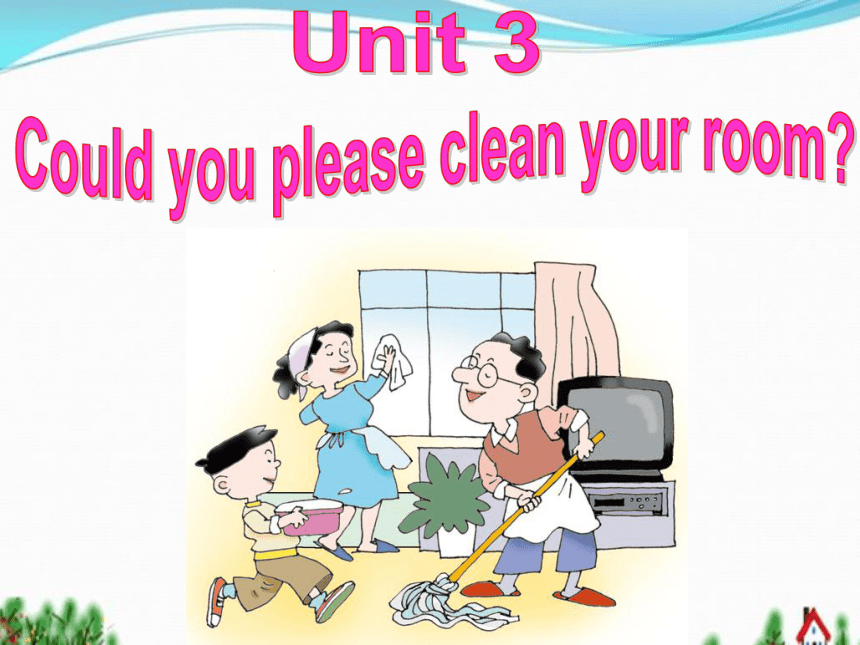 | |
| 格式 | zip | ||
| 文件大小 | 1.7MB | ||
| 资源类型 | 教案 | ||
| 版本资源 | 人教新目标(Go for it)版 | ||
| 科目 | 英语 | ||
| 更新时间 | 2016-03-14 00:47:36 | ||
图片预览

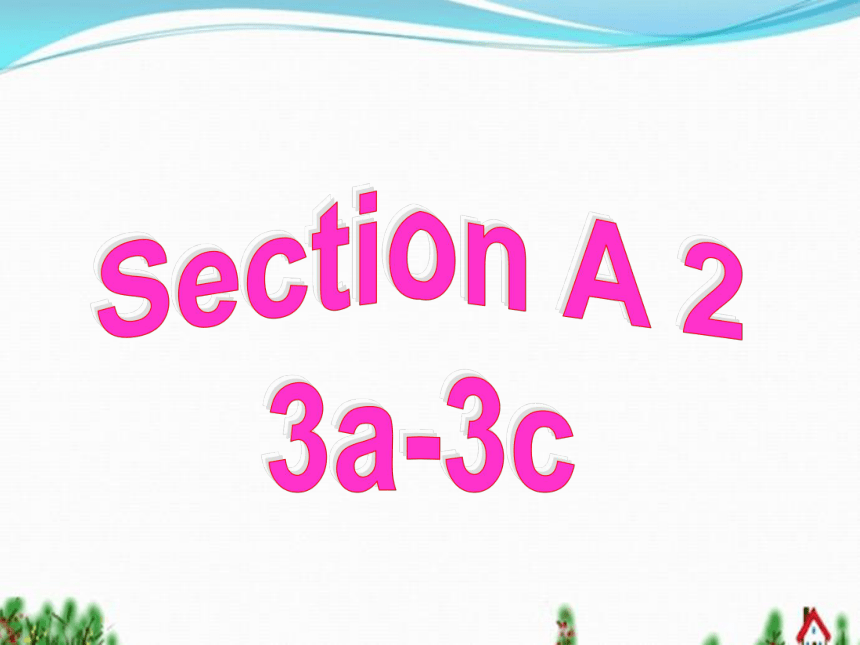
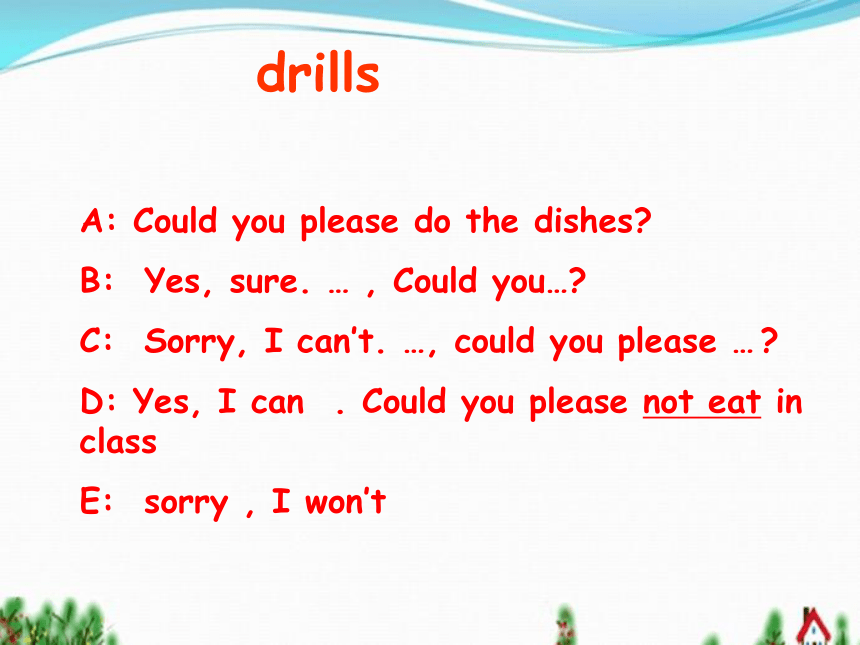
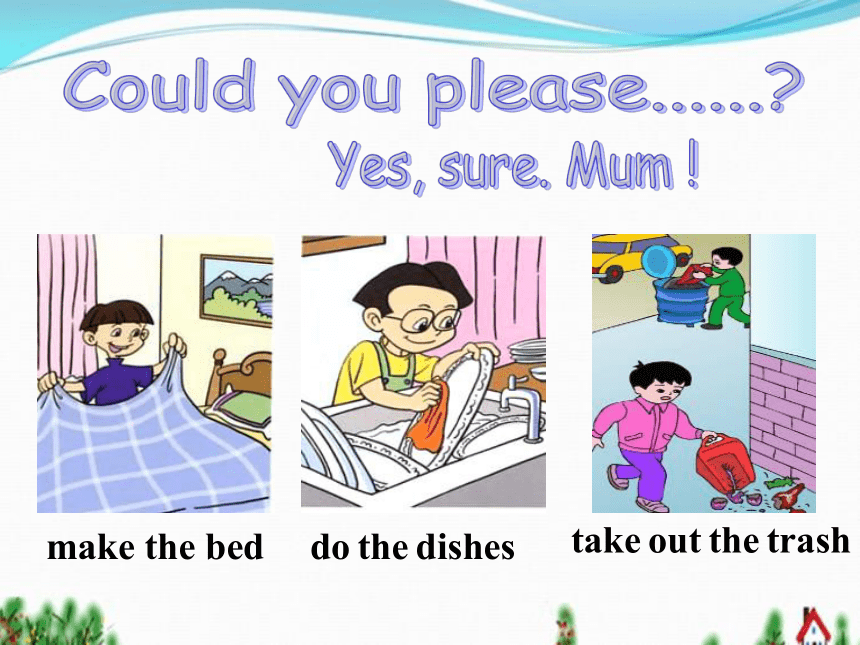
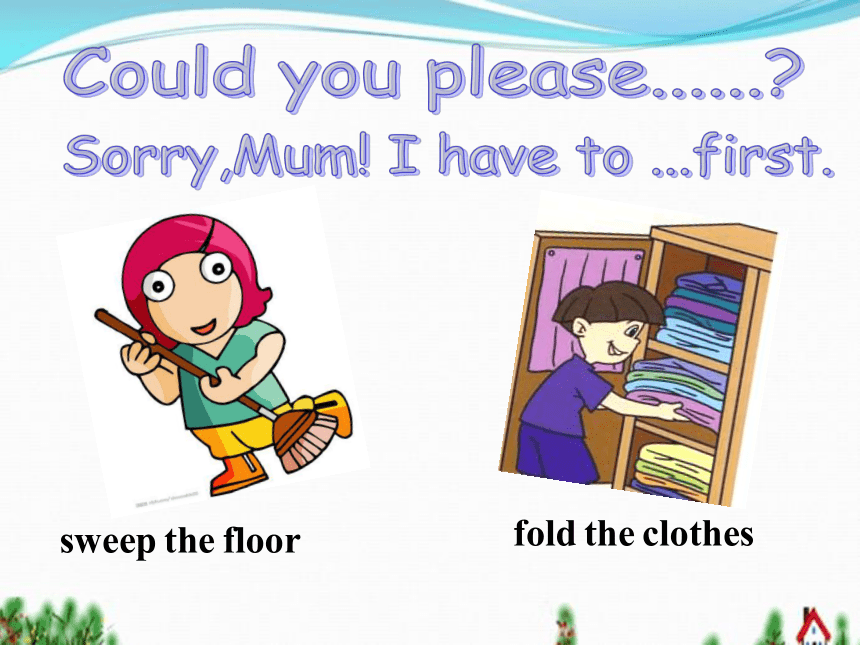
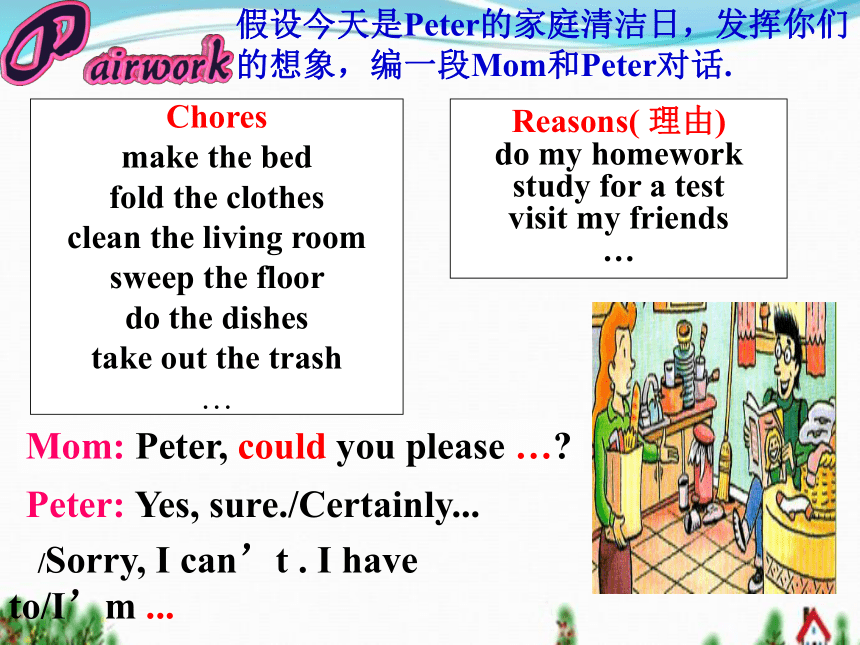
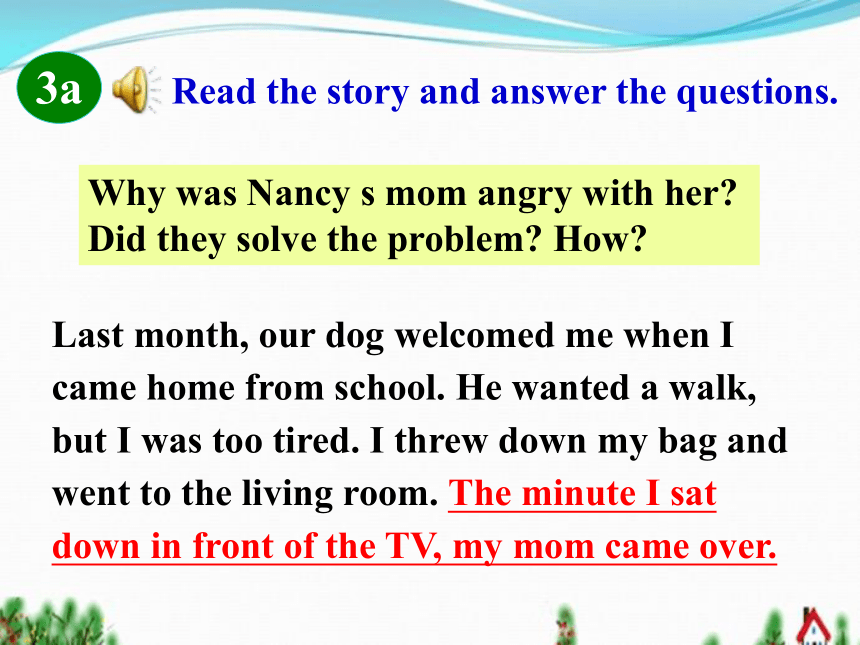
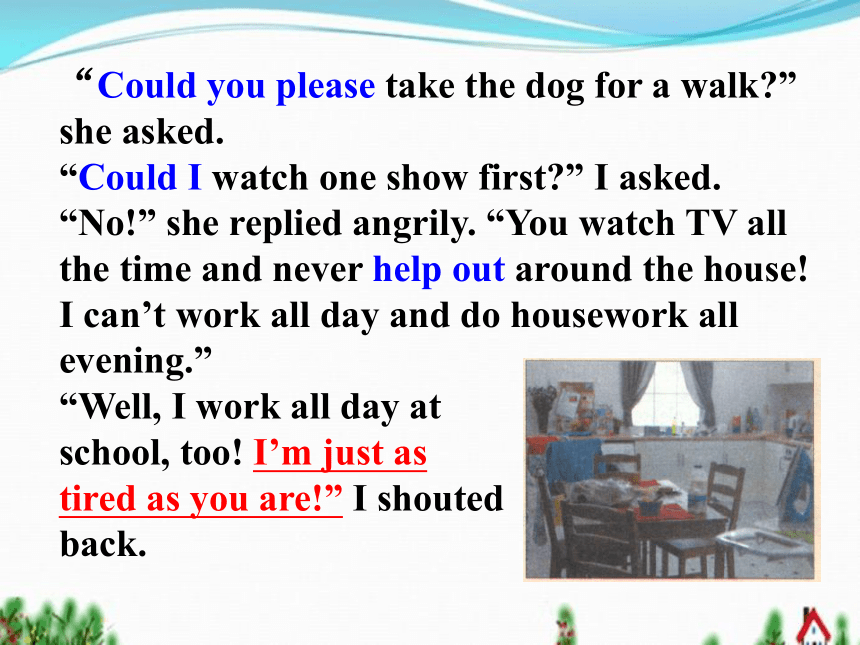
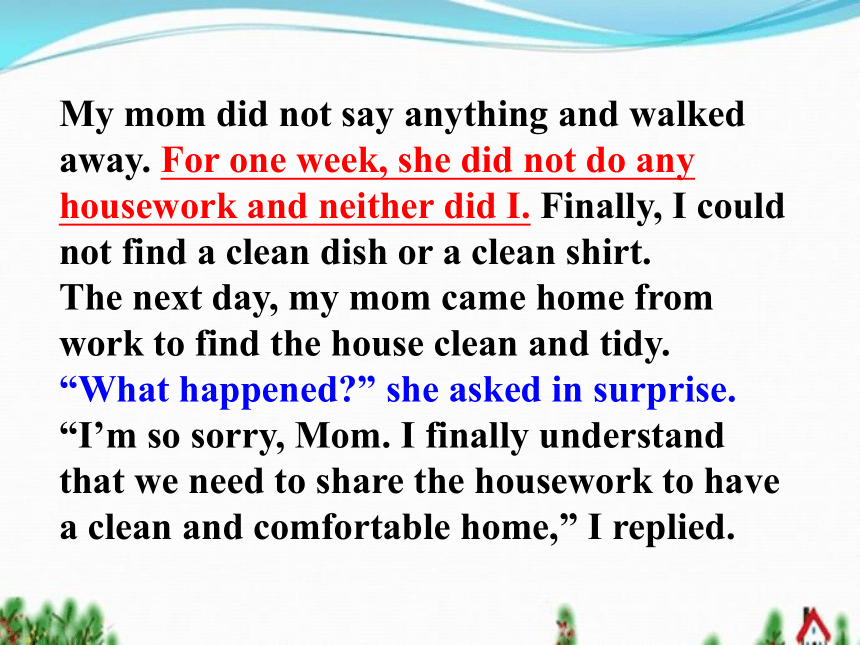
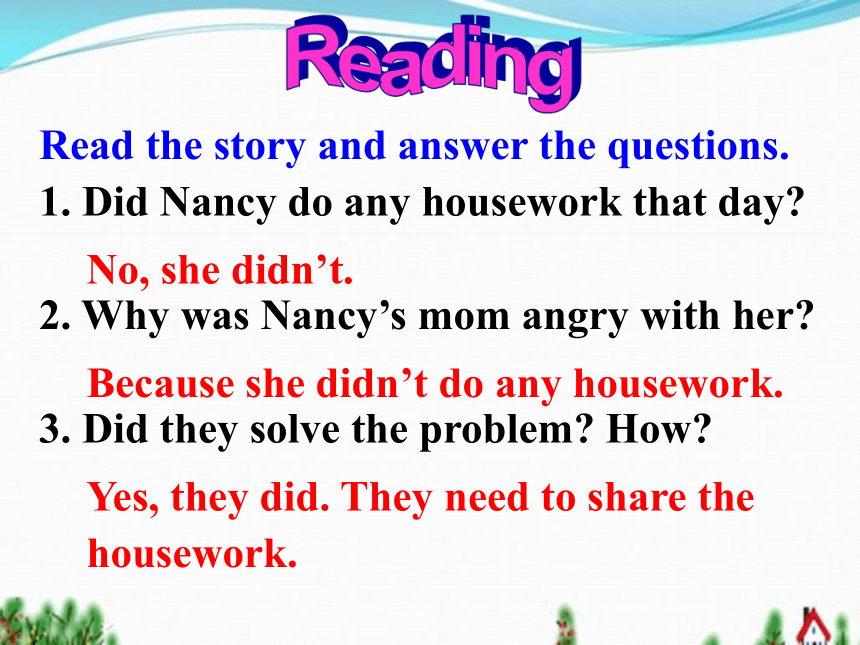
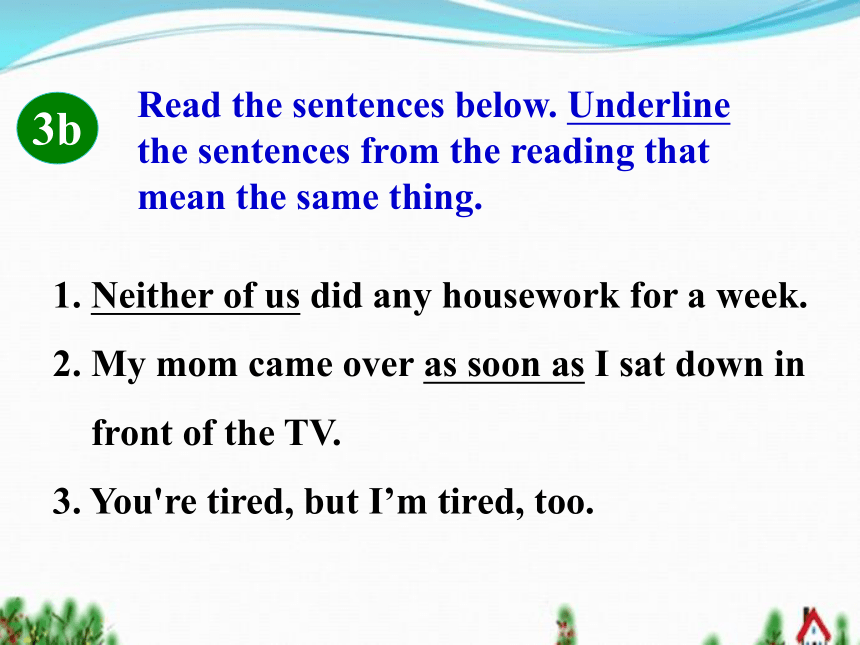
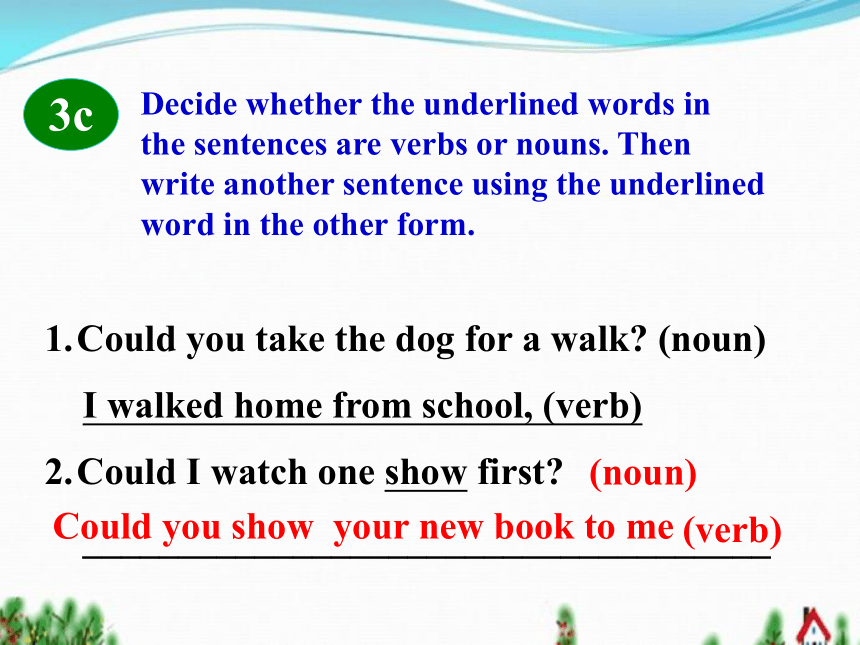
文档简介
课件38张PPT。Unit 3Could you please clean your room?Section A 2
3a-3cdrillsA: Could you please do the dishes?
B: Yes, sure. … , Could you…?
C: Sorry, I can’t. …, could you please … ?
D: Yes, I can . Could you please not eat in class
E: sorry , I won’t do the dishestake out the trashCould you please......?Yes, sure. Mum !make the bedfold the clothesCould you please......?Sorry,Mum! I have to ...first.sweep the floorReasons( 理由)
do my homework
study for a test
visit my friends
…假设今天是Peter的家庭清洁日,发挥你们的想象,编一段Mom和Peter对话.Mom: Peter, could you please …?
Peter: Yes, sure./Certainly... /Sorry, I can’t . I have to/I’m ...Chores
make the bed
fold the clothes
clean the living room
sweep the floor
do the dishes
take out the trash
… Read the story and answer the questions.Last month, our dog welcomed me when I came home from school. He wanted a walk, but I was too tired. I threw down my bag and went to the living room. The minute I sat
down in front of the TV, my mom came over.Why was Nancy s mom angry with her?
Did they solve the problem? How?3a“Could you please take the dog for a walk?” she asked.
“Could I watch one show first?” I asked.
“No!” she replied angrily. “You watch TV all the time and never help out around the house! I can’t work all day and do housework all evening.”
“Well, I work all day at
school, too! I’m just as
tired as you are!” I shouted
back.My mom did not say anything and walked away. For one week, she did not do any housework and neither did I. Finally, I could not find a clean dish or a clean shirt.
The next day, my mom came home from work to find the house clean and tidy.
“What happened?” she asked in surprise.
“I’m so sorry, Mom. I finally understand that we need to share the housework to have a clean and comfortable home,” I replied.Read the story and answer the questions.
1. Did Nancy do any housework that day?
2. Why was Nancy’s mom angry with her?
3. Did they solve the problem? How?No, she didn’t.
Because she didn’t do any housework.
Yes, they did. They need to share the housework.Reading Read the sentences below. Underline
the sentences from the reading that
mean the same thing.
1. Neither of us did any housework for a week.
2. My mom came over as soon as I sat down in
front of the TV.
3. You're tired, but I’m tired, too.3bDecide whether the underlined words in
the sentences are verbs or nouns. Then
write another sentence using the underlined
word in the other form.
Could you take the dog for a walk? (noun)
I walked home from school, (verb)
Could I watch one show first?
____________________________________Could you show your new book to me(noun)(verb)3cI can’t work all day.
____________________________________.
You watch TV all the time.
___________________________________.
“What happened?” she asked in surprise.
___________________________________.(verb)I will do some hard work. (noun)(verb)The man on watch found a ship ahead (noun)(noun)The news surprised me a lot. (verb)1. You watch TV all the time and ...
all the time(在该段时间内)一直;向来, 一向;时时刻刻;每时每刻
e.g. I am busy all the time. = I am always busy 我一直很忙。
This happens all the time.
这种情况是时时发生的。Language points anger angry angrily He is in anger . You had better leave him alone
He looked at me angrily as if I did something wrong
He was angry with me , because I was late again / he was angry at my being late Shout back 顶嘴 shout to sb. 对。。。大喊 Shout at sb. 对。。。愤怒地大吼 come home from work/home/shopping 下班、放学、购物回到家 2. I’m just as tired as you are!
as ... as 意为 “和……一样” ,表示同级的比较。使用时要注意第一个as为副词,第二个as为连词。其基本结构为:as +?adj./?adv.?+ as。
e.g. his?movie?is?as?interesting?as?that?one.
这部电影和那部电影一样有趣。
Your?pen?writes?as?smoothly?as?mine.
你的钢笔书写起来和我的一样流畅。as … as 的否定形式为 “not as/so + adj./adv. + as”。
e.g. He didn’t sing as well as you.
他唱地不如你好。3. For one week, she did not do any housework and neither did I.
neither 用作副词,作“也不”解释,放在句首,表示前面否定的内容也适用于另一个人或物,句子须采用部分倒装。此时也可用nor替换 neither 使用。— I?don’t?like?this?dress.?
我不喜欢这件连衣裙。
— Neither?/?Nor?do?I.?我也不喜欢。
注意:neither 之后的主语要置于助动词或系动词之后。neither 用作代词,表示“两者都不,双方均不”。例如:
He?answered?neither?of?the?letters.?
他两封信都没回。
— Which?one?would?you?like??你喜欢哪一个?
— Neither.?两个都不喜欢。?1. also 是比较正式的用语,语气较庄重。它通常放在句中,位于行为动词之前,连系动词之后; 如有助动词或情态动词,一般放在助动词或情态动词之后。例如:
Peter also has two brothers.
彼得也有两个兄弟。 also, too, either, neither ,so的用法I am also a student. 我也是一名学生。
Mrs. Green can also sing the song in Chinese. 格林夫人也能用汉语唱这首歌。 2. too 一般用在肯定句中,放在句末。 I’m in Row 1, too.
我也在第一排。
注意:also和too一般都用于肯定句,很
少用于否定句。
So 放在肯定句句首. So + V . +S
He can swim well , so can she
Li Lei works hard and so does Kate
3. either 表示“也”时,一般只用于否定句,且置于句末。例如:
I don’t know him. Tom doesn’t know him, either.
我不认识他,汤姆也不认识他。
If you don’t go there, he won’t go there, either.
如果你不去那儿,他也不会去那儿。
注意:either 本身没有否定的意义,多与 not 连用。 4. neither 表示“两个都不”,它作主语
时,谓语动词常用单数。例如:
Neither of you can do it.
你们两个都不能做这件事。5. “What happened?” she asked in surprise.
他惊讶的问道:“发生什么事情了?”
介词短语 in surprise 表示状态,意思是“吃惊
地, 惊讶地”。 再如:
she looked at me in great surprise and asked
for a long while, “Don’t you just leave for
Australia this morning?”
. he heard the news in surprise
Surprised surprising Be surprised at …
Be surprised to do
Be surprised that ….
The news is surprising . I was surprised at it
The result surprised me
= the result made me surprised 2. Important sentences
The minute /as soon as I sat down in front of the TV, my mom came over.
For one week, she did not do any housework, and neither did I.
I’m just as tired as you are!Grammar FocusKey sentence structures Could you(please)+ V-原形?
表示委婉地提出请求1. Could you please clean your room?
Yes, sure./ Of course./ Certainly./All
right.
2. Could you please do the dishes?
Sorry, I can’t. I have to do my
homework. —Peter, could you please take out the
trash?
—Sure, Mom. —Could you please do the dishes?
—Sorry, I can’t. I have to do my
homework. 重难点点评Write R for requests and P for permissions. Then match each one with the correct response. _____ Could I hang out with my friends
after the movie?
2. ____Could you please pass me the salt?
3.____Could I borrow that book?
4.____Could you help me do the dishes?
5.____Could you lend me some money?PRPRR4aYes, here you are.
Hmm. How much do you need?
Yes, sure. No problem. I finished reading
it last night.
d. Yes, but don’t come back too late.
e. No, I can't I cut my finger and I’m trying
not to get it wet.1—d 2---a 3---c 4---e 5---bFill in the blanks in the conversation.
A: I hate to______ chores.
B: Well, I hate some chores too, but I like
other chores.
A: Really? Great! ________I ask you to____
me with some chores then?
B: What do you need help with ?
A: ______ you please _____my clothes for me?
B: I don’t want to do that! It’s boring!Could dohelpCould fold4bA: OK. Then______ you ______do the dishes
for me?
B: Sure, no problem. But_______ we go to
the movies after that?
A: Sure, I’ll finish my homework while you help me with the dishes. Then we can go to the movies.couldpleasecouldIf we are having a camping trip, what should we do before the trip?DiscussionWhat should we do before the trip?buy some drinksbuy some foodtake a big cloth bring a tenttake an umbrellatake a rubbish bag bring a cameraprepare some programs4c Make a list of things your group needs to
do for a camping trip. Then discuss who will
do bring a tent them and complete the chart.A: Could you please bring Liu Chang?
B: Sure. And could you please …?
C: Sorry, I can’t. I have to…Pair workBorrow lend keep
borrow和lend都有“借”的意思,但它们的含义和用法有所不同。
★ borrow表示“借入”,即把本来不属于自己的东西借来暂时使用,常与介词from连用。如:
You can borrow a book from the library.?
★ lend表示“借出”,即把属于自己的东西借给别人暂时使用,常与介词to连用,也可以跟双宾语。如:
He’s going to lend his bike to Tom.
You mustn’t lend others my pen.?
★借用一段时间用keep
How long can I keep the book ?
You can keep my bike for 2 days hate用作动词,与like意义相反,意为“憎恨,厌恶,不喜欢”,其后可接名词、代词、动词的-ing形式以及动词不定式等。
e.g. Lily hates mice /me.
Jim hated exercising when he was
young.
I hate to do the dishes.
3a-3cdrillsA: Could you please do the dishes?
B: Yes, sure. … , Could you…?
C: Sorry, I can’t. …, could you please … ?
D: Yes, I can . Could you please not eat in class
E: sorry , I won’t do the dishestake out the trashCould you please......?Yes, sure. Mum !make the bedfold the clothesCould you please......?Sorry,Mum! I have to ...first.sweep the floorReasons( 理由)
do my homework
study for a test
visit my friends
…假设今天是Peter的家庭清洁日,发挥你们的想象,编一段Mom和Peter对话.Mom: Peter, could you please …?
Peter: Yes, sure./Certainly... /Sorry, I can’t . I have to/I’m ...Chores
make the bed
fold the clothes
clean the living room
sweep the floor
do the dishes
take out the trash
… Read the story and answer the questions.Last month, our dog welcomed me when I came home from school. He wanted a walk, but I was too tired. I threw down my bag and went to the living room. The minute I sat
down in front of the TV, my mom came over.Why was Nancy s mom angry with her?
Did they solve the problem? How?3a“Could you please take the dog for a walk?” she asked.
“Could I watch one show first?” I asked.
“No!” she replied angrily. “You watch TV all the time and never help out around the house! I can’t work all day and do housework all evening.”
“Well, I work all day at
school, too! I’m just as
tired as you are!” I shouted
back.My mom did not say anything and walked away. For one week, she did not do any housework and neither did I. Finally, I could not find a clean dish or a clean shirt.
The next day, my mom came home from work to find the house clean and tidy.
“What happened?” she asked in surprise.
“I’m so sorry, Mom. I finally understand that we need to share the housework to have a clean and comfortable home,” I replied.Read the story and answer the questions.
1. Did Nancy do any housework that day?
2. Why was Nancy’s mom angry with her?
3. Did they solve the problem? How?No, she didn’t.
Because she didn’t do any housework.
Yes, they did. They need to share the housework.Reading Read the sentences below. Underline
the sentences from the reading that
mean the same thing.
1. Neither of us did any housework for a week.
2. My mom came over as soon as I sat down in
front of the TV.
3. You're tired, but I’m tired, too.3bDecide whether the underlined words in
the sentences are verbs or nouns. Then
write another sentence using the underlined
word in the other form.
Could you take the dog for a walk? (noun)
I walked home from school, (verb)
Could I watch one show first?
____________________________________Could you show your new book to me(noun)(verb)3cI can’t work all day.
____________________________________.
You watch TV all the time.
___________________________________.
“What happened?” she asked in surprise.
___________________________________.(verb)I will do some hard work. (noun)(verb)The man on watch found a ship ahead (noun)(noun)The news surprised me a lot. (verb)1. You watch TV all the time and ...
all the time(在该段时间内)一直;向来, 一向;时时刻刻;每时每刻
e.g. I am busy all the time. = I am always busy 我一直很忙。
This happens all the time.
这种情况是时时发生的。Language points anger angry angrily He is in anger . You had better leave him alone
He looked at me angrily as if I did something wrong
He was angry with me , because I was late again / he was angry at my being late Shout back 顶嘴 shout to sb. 对。。。大喊 Shout at sb. 对。。。愤怒地大吼 come home from work/home/shopping 下班、放学、购物回到家 2. I’m just as tired as you are!
as ... as 意为 “和……一样” ,表示同级的比较。使用时要注意第一个as为副词,第二个as为连词。其基本结构为:as +?adj./?adv.?+ as。
e.g. his?movie?is?as?interesting?as?that?one.
这部电影和那部电影一样有趣。
Your?pen?writes?as?smoothly?as?mine.
你的钢笔书写起来和我的一样流畅。as … as 的否定形式为 “not as/so + adj./adv. + as”。
e.g. He didn’t sing as well as you.
他唱地不如你好。3. For one week, she did not do any housework and neither did I.
neither 用作副词,作“也不”解释,放在句首,表示前面否定的内容也适用于另一个人或物,句子须采用部分倒装。此时也可用nor替换 neither 使用。— I?don’t?like?this?dress.?
我不喜欢这件连衣裙。
— Neither?/?Nor?do?I.?我也不喜欢。
注意:neither 之后的主语要置于助动词或系动词之后。neither 用作代词,表示“两者都不,双方均不”。例如:
He?answered?neither?of?the?letters.?
他两封信都没回。
— Which?one?would?you?like??你喜欢哪一个?
— Neither.?两个都不喜欢。?1. also 是比较正式的用语,语气较庄重。它通常放在句中,位于行为动词之前,连系动词之后; 如有助动词或情态动词,一般放在助动词或情态动词之后。例如:
Peter also has two brothers.
彼得也有两个兄弟。 also, too, either, neither ,so的用法I am also a student. 我也是一名学生。
Mrs. Green can also sing the song in Chinese. 格林夫人也能用汉语唱这首歌。 2. too 一般用在肯定句中,放在句末。 I’m in Row 1, too.
我也在第一排。
注意:also和too一般都用于肯定句,很
少用于否定句。
So 放在肯定句句首. So + V . +S
He can swim well , so can she
Li Lei works hard and so does Kate
3. either 表示“也”时,一般只用于否定句,且置于句末。例如:
I don’t know him. Tom doesn’t know him, either.
我不认识他,汤姆也不认识他。
If you don’t go there, he won’t go there, either.
如果你不去那儿,他也不会去那儿。
注意:either 本身没有否定的意义,多与 not 连用。 4. neither 表示“两个都不”,它作主语
时,谓语动词常用单数。例如:
Neither of you can do it.
你们两个都不能做这件事。5. “What happened?” she asked in surprise.
他惊讶的问道:“发生什么事情了?”
介词短语 in surprise 表示状态,意思是“吃惊
地, 惊讶地”。 再如:
she looked at me in great surprise and asked
for a long while, “Don’t you just leave for
Australia this morning?”
. he heard the news in surprise
Surprised surprising Be surprised at …
Be surprised to do
Be surprised that ….
The news is surprising . I was surprised at it
The result surprised me
= the result made me surprised 2. Important sentences
The minute /as soon as I sat down in front of the TV, my mom came over.
For one week, she did not do any housework, and neither did I.
I’m just as tired as you are!Grammar FocusKey sentence structures Could you(please)+ V-原形?
表示委婉地提出请求1. Could you please clean your room?
Yes, sure./ Of course./ Certainly./All
right.
2. Could you please do the dishes?
Sorry, I can’t. I have to do my
homework. —Peter, could you please take out the
trash?
—Sure, Mom. —Could you please do the dishes?
—Sorry, I can’t. I have to do my
homework. 重难点点评Write R for requests and P for permissions. Then match each one with the correct response. _____ Could I hang out with my friends
after the movie?
2. ____Could you please pass me the salt?
3.____Could I borrow that book?
4.____Could you help me do the dishes?
5.____Could you lend me some money?PRPRR4aYes, here you are.
Hmm. How much do you need?
Yes, sure. No problem. I finished reading
it last night.
d. Yes, but don’t come back too late.
e. No, I can't I cut my finger and I’m trying
not to get it wet.1—d 2---a 3---c 4---e 5---bFill in the blanks in the conversation.
A: I hate to______ chores.
B: Well, I hate some chores too, but I like
other chores.
A: Really? Great! ________I ask you to____
me with some chores then?
B: What do you need help with ?
A: ______ you please _____my clothes for me?
B: I don’t want to do that! It’s boring!Could dohelpCould fold4bA: OK. Then______ you ______do the dishes
for me?
B: Sure, no problem. But_______ we go to
the movies after that?
A: Sure, I’ll finish my homework while you help me with the dishes. Then we can go to the movies.couldpleasecouldIf we are having a camping trip, what should we do before the trip?DiscussionWhat should we do before the trip?buy some drinksbuy some foodtake a big cloth bring a tenttake an umbrellatake a rubbish bag bring a cameraprepare some programs4c Make a list of things your group needs to
do for a camping trip. Then discuss who will
do bring a tent them and complete the chart.A: Could you please bring Liu Chang?
B: Sure. And could you please …?
C: Sorry, I can’t. I have to…Pair workBorrow lend keep
borrow和lend都有“借”的意思,但它们的含义和用法有所不同。
★ borrow表示“借入”,即把本来不属于自己的东西借来暂时使用,常与介词from连用。如:
You can borrow a book from the library.?
★ lend表示“借出”,即把属于自己的东西借给别人暂时使用,常与介词to连用,也可以跟双宾语。如:
He’s going to lend his bike to Tom.
You mustn’t lend others my pen.?
★借用一段时间用keep
How long can I keep the book ?
You can keep my bike for 2 days hate用作动词,与like意义相反,意为“憎恨,厌恶,不喜欢”,其后可接名词、代词、动词的-ing形式以及动词不定式等。
e.g. Lily hates mice /me.
Jim hated exercising when he was
young.
I hate to do the dishes.
同课章节目录
- Unit 1 What's the matter?
- Section A
- Section B
- Unit 2 I'll help to clean up the city parks.
- Section A
- Section B
- Unit 3 Could you please clean your room?
- Section A
- Section B
- Unit 4 Why don't you talk to your parents?
- Section A
- Section B
- Unit 5 What were you doing when the rainstorm came
- Section A
- Section B
- Review of Units 1-5
- Unit 6 An old man tried to move the mountains.
- Section A
- Section B
- Unit 7 What's the highest mountain in the world?
- Section A
- Section B
- Unit 8 Have you read Treasure Island yet?
- Section A
- Section B
- Unit 9 Have you ever been to a museum?
- Section A
- Section B
- Unit 10 I've had this bike for three years.
- Section A
- Section B
